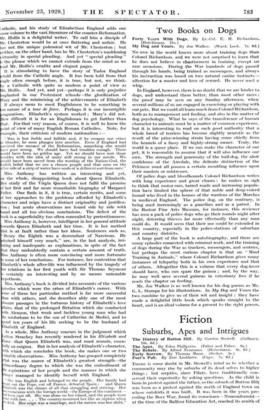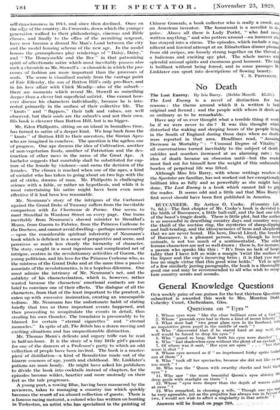Fiction
Suburbs, Apes and Intrigues
THERE is some doubt in Mr. Stowell's mind as to whether a community may rise by suburbs of its dead selves to higher things ; but sceptics, since Pilate, have traditionally con- served their superiority by asking questions. As the child is born in protest against the father, so the suburb of Button Hill was born as a protest against the north of England town on whose outskirts it was built. It was born in the years pre- ceding the Boer War, found its conscience—Nonconformist- at the time of the Balfour Education Act, reached its zenith of
self-consciousness in 1914, and since then declined. Once on the edge of the country, its Crescents, down which the younger generation walked to their philanderings, cinemas and Bible Classes, and finally to the office of the recruiting sergeant, have now become a dismal No Man's Land between the city and the model housing scheme of the new age. In the model houses the gramophones play renderings of " Daisy, Daisy," and '• The Honeysuckle and the Bee " in that patronizing spirit of affectionate satire which must inevitably possess also such a chronicle as Mr. Stowell's—a chronicle in which the pro- cesses of fashion are more important than the processes of souls. The scene is visualized mainly from the vantage point of Eric Ellersby, the son of Button Hill's only pro-Boer, and in his love affair with Chick Mendip—also of the suburb— there are moments which reveal Mr. Stowell as sornething deeper than a clever but superficial satirist. One cannot how- ever discuss his characters individually, because he is inte- rested primarily in the surface of their collective life. The knuts " and " flappers," their talk and values, are well observed, but their souls are the suburb's and not their own. His book is cleverer than Button Hill, but is no bigger.
Mr. Eden Phillpotts, sitting on an island in boundless time, has turned to satire of a deeper kind. We leap back from the knuts " of Button Hill to their ancestors, the Simian Apes, who are imagined in conclave. The question is the ageless one of progress. One ape dreams the idea of Cultivation, another of non-vegetarian foods, another of Patriotism and the des- truction of other races in the name of the &resit Ape. A bachelor suggests that courtship shall be substituted for cap- ture of the female by violence—and earns the derision of the females. The climax is reached when one of the apes, a kind of socialist who has taken to going about on two legs with the aid of sticks, dreams of man. Mr. Phillpotts is challenging science with a fable, or rather an hypothesis, and while it is most entertaining his satire might have been even more effective if it had been less reasonable.
Mr. Neumann's story of the intrigues of the Carbonari against the Grand Duke of Tuscany suffers from the inevitable comparison with La Chartreuse de Panne. One seems to meet Stendhal in Wardour Street on every page. One turns inevitably from Neumann's shrewd minister to Stendhal's Mosca, from Guerra to Fabrice, from the Princess Corleone to the Duchess, and cannot avoid dwelling—perhaps unnecessarily —upon the considerable spiritual inferiority of Neumann's book which is deficient in a sense of perspective and scene, and perceives so much less clearly the hierarchy of character. The story, caught in a most ingenious and complicated net of intrigue, centres in the revolutionary activities of Guerra, the young politician, and his love for the Princess Corleone who, as the mistress of the Grand Duke and at the same time a passive associate of the revolutionaries, is in a hopeless dilemma. One must admire the intricacy of Mr. Neumann's net, and the subtlety of his characterization, which is, however, rather wasted because the characters' emotional contacts are too brief to convince one of their effects. The dialogue of all the characters, from that of the least important to the greatest, is eaten up with excessive insinuation, creating an unescapable tedium. Mr. Neumann has the unfortunate habit of stating briefly that two or three important events happened, and then proceeding to recapitulate the events in detail, thus stealing his own thunder. The translator is presumably to be blamed for certain " eternal cigarettes " and " eternal monocles." In spite of all, The Rebels has a dozen moving and exciting situations and has unquestionable, distinction.
Mr'. Thomas Mann's delicate and sugary trifle' can be read in half-an-hour. It is the story of a tiny little girl's passion for one of the dancers at a Professor's party to which an odd collection of people have been invited. The book is a master- piece of distillation—a kind of Benedictine made out of the bizarre essences of age, youth and childhood. Mr. Linklater's potions are more heady. He might have asked his publishers to divide the book into cocktails instead of chapters, for the episodes become wilder, heartier and more unsteady on their feet as the tale progresses.
A young poet, a rowing Blue, having been massacred by the reviewers, takes to managing a country inn which quickly becomes the resort of an absurd collection of guests. There is a famous racing motorist, a colonel who has written on hunting in Turkestan, an artist who has specialized in the painting of
Chinese Generals, a book collector who is really a crook, ant An American inventor. The housemaid is a novelist in di, guise.. Above all there is Lady YOrlet, "who had never Written anything," and who potters around—an innocent who has strayed into a circus. The episodes, which include a mtg. nificent and farcical attempt at an Elizabethan dinner planner from old recipes, are loosely strung together on the thread of a ludicrous and exciting spy plot. The whole moves witl splendid animal spirits and enormous good humour. The tall is brilliant without being forced, and in some passages Mr Linklater can spurt into descriptions of flowing beauty.
V. S. ParrcirErr.































































 Previous page
Previous page